新人教版七年级英语上册Unit 5 Do you have a soccer ball6 导学案
人教版英语七上 U5 Do you have a soccer ball 讲义

Unit5 Do you have a soccer ball?一、重点词汇及拓展1. have v.(1) 有e.g. I have a pen. 我有一只钢笔。
(2) 吃;喝e.g. I have breakfast every day. 我每天吃早饭。
(3) 经历e.g. have a good time 玩得开心;过得愉快(4) 上课e.g. We have English lessons every day. 我们每天上英语课。
(5) 举办e.g. Mark has a party. 马克举办了一个派对。
(6) 得…病e.g. He has a cold and a headache. 他感冒和头疼。
2. let v.允许;让let’s = let us 让我们let sb. do sth. 让某人做某事let sb. not do sth. 让某人不要做某事e.g. Let’s have a party tonight! 让我们今晚举办一个派对吧!make sb. do sth. 使某人做某事e.g. The movie makes me miss my mother. 这部电影使我怀念我的妈妈。
3. go v.去;走go to +地点去某地go to school 去学校go here/there/home 去这儿/去那/回家go shopping 去购物go swimming 去游泳go hiking 去远足go skating 去轮滑go boating 去划船4. lateadj. 迟的;晚的be late for school 上学迟到be late for class 上课迟到1be late for work 上班迟到adv. 迟地;晚地later adv. 后来;以后e.g. Three days later, he found his father. (句中有段时间+later,句子用一般过去时)三天后,他找到了他的爸爸。
七年级英语上册 Unit 5 Do you have a soccer ball(单词+重点句型)语法解析
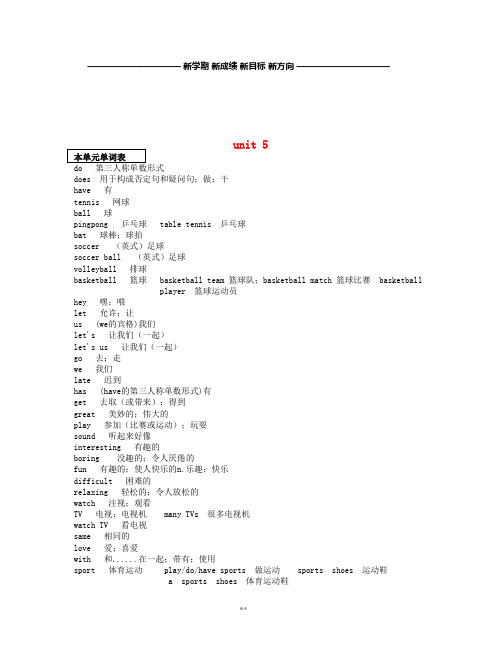
——————————新学期新成绩新目标新方向——————————unit 5does 用于构成否定句和疑问句;做;干have 有tennis 网球ball 球pingpong 乒乓球 table tennis 乒乓球bat 球棒;球拍soccer (英式)足球soccer ball (英式)足球volleyball 排球basketball 篮球 basketball team 篮球队;basketball match 篮球比赛 basketball player 篮球运动员hey 嘿;喂let 允许;让us (we的宾格)我们let's 让我们(一起)let's us 让我们(一起)go 去;走we 我们late 迟到has (have的第三人称单数形式)有get 去取(或带来);得到great 美妙的;伟大的play 参加(比赛或运动);玩耍sound 听起来好像interesting 有趣的boring 没趣的;令人厌倦的fun 有趣的;使人快乐的n.乐趣;快乐difficult 困难的relaxing 轻松的;令人放松的watch 注视;观看TV 电视;电视机 many TVs 很多电视机watch TV 看电视same 相同的love 爱;喜爱with 和......在一起;带有;使用sport 体育运动 play/do/have sports 做运动 sports shoes 运动鞋a sports shoes 体育运动鞋them (they的宾格)他(她、它)们only 只;仅like 喜欢;喜爱easy 容易的;不费力的after 在......以后class 班级;课(近义词:lessen);等级;类别;阶段classmate 同班同学 roommate 室友 workmate 同事 deskmate 同桌schoolmate 校友Bill 比尔(男名)on的用法,详见unit4【解析】on可以表示“通过;使用……方式”,后面通常接表示通信工具的名词。
Unit 5 Do you have a soccer ball 知识点归纳-七年级上册英语

人教版新目标七上英语单元知识点归纳Unit 5 Do you have a soccer ball?重点词汇tennis/'tenis/ n. 网球bat /bæt/ n. 球棒;球拍soccer ball (英式)足球volleyball/'vɔlibɔ:l/ n. 排球basketball/'ba:skitbɔ:l/ n. 篮球late/leit/ adj. 迟到great/greit/ adj. 美妙的;伟大的play/plei/ v. 参加(比赛或运动);玩耍sound/saund/ v. 听起来好像interesting/'intrəstiŋ/ adj. 有趣的boring/'bɔ:riŋ/ adj. 没趣的;令人厌倦的fun/fʌn/ adj. 有趣的;使人快乐的n.乐趣;快乐difficult/'difikəlt/ adj. 困难的relaxing/ri'læksiŋ/ adj. 轻松的;令人放松的watch/wɔtʃ/ v. 注视;观看same/seim/ adj. 相同的easy/'i:zi/ adj. 容易的;不费力的class/kla:s/ n. 班级;课classmate/'kla:smeit/ n. 同班同学重点短语:a tennis bat 一个网球拍play basketball 打篮球baseball bat 棒球棒have a soccer ball 有一个足球play soccer 踢足球with our friends 和我们的朋友一起have a ping-pong ball 有一个乒乓球play ping-pong 打乒乓球have a volleyball 有一个排球play volleyball 打排球at school 在校,上学play sports 做运动watch TV 看电视in my bag 在我的包里be late 迟到on TV 电视上必背典句:1. Do you have a soccer ball? 你有一个足球吗?2. Does he/she have a ping-pong ball?他/她有一个乒乓球吗?3. Do you play sports with your classmates? 你和你的同学一起做运动吗?4. Let’s play soccer together! 我们一起踢足球吧!5. How many sports do you like?你喜欢多少种运动?6. I like playing soccer and basketball. 我喜欢踢足球和打篮球。
人教版新课标英语七年级上册《Unit 5 Do you have a soccer ball Sec
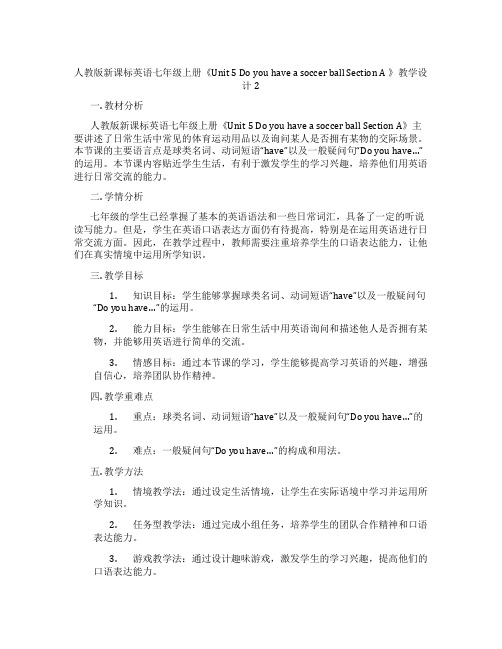
人教版新课标英语七年级上册《Unit 5 Do you have a soccer ball Section A 》教学设计2一. 教材分析人教版新课标英语七年级上册《Unit 5 Do you have a soccer ball Section A》主要讲述了日常生活中常见的体育运动用品以及询问某人是否拥有某物的交际场景。
本节课的主要语言点是球类名词、动词短语“have”以及一般疑问句“Do you have…”的运用。
本节课内容贴近学生生活,有利于激发学生的学习兴趣,培养他们用英语进行日常交流的能力。
二. 学情分析七年级的学生已经掌握了基本的英语语法和一些日常词汇,具备了一定的听说读写能力。
但是,学生在英语口语表达方面仍有待提高,特别是在运用英语进行日常交流方面。
因此,在教学过程中,教师需要注重培养学生的口语表达能力,让他们在真实情境中运用所学知识。
三. 教学目标1.知识目标:学生能够掌握球类名词、动词短语“have”以及一般疑问句“Do you have…”的运用。
2.能力目标:学生能够在日常生活中用英语询问和描述他人是否拥有某物,并能够用英语进行简单的交流。
3.情感目标:通过本节课的学习,学生能够提高学习英语的兴趣,增强自信心,培养团队协作精神。
四. 教学重难点1.重点:球类名词、动词短语“have”以及一般疑问句“Do you have…”的运用。
2.难点:一般疑问句“Do you have…”的构成和用法。
五. 教学方法1.情境教学法:通过设定生活情境,让学生在实际语境中学习并运用所学知识。
2.任务型教学法:通过完成小组任务,培养学生的团队合作精神和口语表达能力。
3.游戏教学法:通过设计趣味游戏,激发学生的学习兴趣,提高他们的口语表达能力。
六. 教学准备1.教师准备:提前准备好教学课件、球类图片、实物球类等教学资源。
2.学生准备:预习本节课内容,了解球类名词和动词短语“have”的用法。
人教版七年级上册英语Unit5Doyouhaveasoccerball
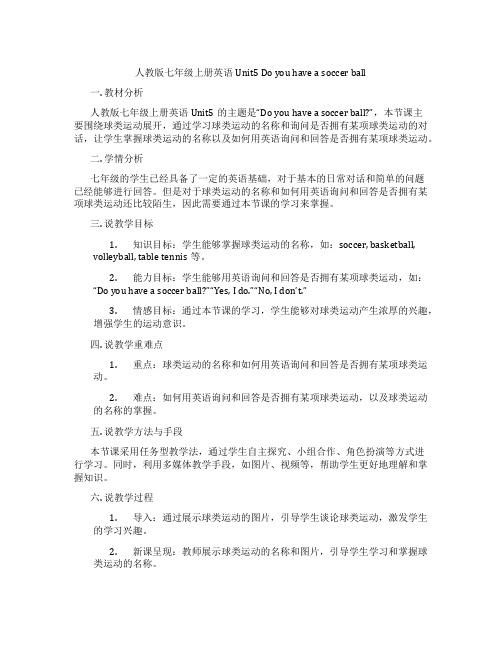
人教版七年级上册英语Unit5 Do you have a soccer ball一. 教材分析人教版七年级上册英语Unit5的主题是“Do you have a soccer ball?”,本节课主要围绕球类运动展开,通过学习球类运动的名称和询问是否拥有某项球类运动的对话,让学生掌握球类运动的名称以及如何用英语询问和回答是否拥有某项球类运动。
二. 学情分析七年级的学生已经具备了一定的英语基础,对于基本的日常对话和简单的问题已经能够进行回答。
但是对于球类运动的名称和如何用英语询问和回答是否拥有某项球类运动还比较陌生,因此需要通过本节课的学习来掌握。
三. 说教学目标1.知识目标:学生能够掌握球类运动的名称,如:soccer, basketball,volleyball, table tennis等。
2.能力目标:学生能够用英语询问和回答是否拥有某项球类运动,如:“Do you have a soccer ball?”“Yes, I do.”“No, I don’t.”3.情感目标:通过本节课的学习,学生能够对球类运动产生浓厚的兴趣,增强学生的运动意识。
四. 说教学重难点1.重点:球类运动的名称和如何用英语询问和回答是否拥有某项球类运动。
2.难点:如何用英语询问和回答是否拥有某项球类运动,以及球类运动的名称的掌握。
五. 说教学方法与手段本节课采用任务型教学法,通过学生自主探究、小组合作、角色扮演等方式进行学习。
同时,利用多媒体教学手段,如图片、视频等,帮助学生更好地理解和掌握知识。
六. 说教学过程1.导入:通过展示球类运动的图片,引导学生谈论球类运动,激发学生的学习兴趣。
2.新课呈现:教师展示球类运动的名称和图片,引导学生学习和掌握球类运动的名称。
3.对话练习:学生两人一组,模拟对话场景,练习如何用英语询问和回答是否拥有某项球类运动。
4.小组活动:学生分成小组,进行角色扮演,模拟真实场景,运用所学知识进行对话。
新人教版新目标七年级英语上册《U...

1 Unit5 Do you have a soccer ball?Period One (1a-1c)一.教材分析:通过uint4单元询问物品在哪的学习,过渡到本单元谈论物品的所属关系。
而本单元的核心语言项目是talk about ownership, 展开学习;以及围绕make suggestions 展开能力训练。
展开能力训练。
主要话题是主要话题是spending time with friends ,培养同学间团结、友爱的精神。
学会使用have 对物品的所属进行提问及回答,以掌握行为动词在一般现在时中的构成和使用;同时引导学生使用所学的句型谈论自己在球类运动中的喜好运动中的喜好,,以及谈论自己对某项运动的感受等。
本部分1a 中的主题图呈现了房间的情景,自然的将学生带入语言交流的自然环境中,引入了房间内常见物品的话题词汇和主要句型。
1a-1c 通过图文及听力练习导入整个单元的话题,是整个Section A 的基础.二.学情分析:本单元的主题是使用have 对物品的所属进行提问及回答,以掌握行为动词在一般现在时中的构成和使用;同时引导学生使用所学的句型谈论自己在球类运动中的喜好。
行为动词在一般现在时的肯定句、否定句和一般疑问句中的构成和使用是初中英语教学中非常重要的内容,七年级的学生经过小学的学习之后,已经具备了一定的英语语言功底,在思维能力方面有较强的记忆力和模仿力,但知识的扩展和运用能力有待于进一步提高,在认知心理方面,学生有较强的求知欲和表现欲。
并初步具备了合作探究能力。
三. Teaching Aims:1. Language goals:Key vocabulary: tennis, soccer, ball, volleyball, basketball, ping-pong2. Target language:----Do you have…? Do you have…?----Yes, I do. /No, I don’t.Yes, I do. /No, I don’t. 3. Ability goalsAsk and answer questions about the ownership.Train the students’ communicative competence and listening skill.4. Moral goalsDo sports every day and keep healthy.四.Teaching important points: 1. The words about ball.2. The target language.----Do you have…? Do you have…? ----Yes, I do. /No, I don’t.Yes, I do. /No, I don’t. ----Does she/he have…? Does she/he have…?----Yes, she/he does./No, she/ he doesn’t.Yes, she/he does./No, she/ he doesn’t. 五.Teaching difficult points:1. Have 与has 的使用的使用2. Do 与does 开头的一般疑问句开头的一般疑问句六.教法与学法:看图认读读单词法,模仿跟读、情境交际,合作交流等方法让学生掌握一些生活学习用品。
人教新目标版英语七年级上册Unit5Doyouhaveasoccerball单元测
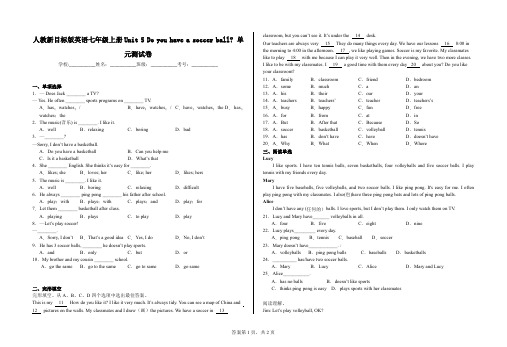
人教新目标版英语七年级上册Unit 5 Do you have a soccer ball? 单元测试卷学校:___________姓名:___________班级:___________考号:___________一、单项选择1.— Does Jack ________ a TV?— Yes. He often ________ sports programs on ________ TV. A .has ;watches ;/ B .have ;watches ;/ C .have ;watches ;the D .has ;watches ;the2.The music(音乐) is ________. I like it. A .well B .relaxing C .boring D .bad 3.—________?—Sorry, I don’t have a basketball. A .Do you have a basketballB .Can you help meC .Is it a basketballD .What’s that 4.She ________ English. She thinks it’s easy for ________. A .likes; she B .loves; her C .like; her D .likes; hers 5.The music is ________. I like it.A .wellB .boringC .relaxingD .difficult 6.He always ________ ping -pong ________ his father after school. A .play ;with B .plays ;with C .plays ;and D .play ;for 7.Let them ________ basketball after class. A .playing B .plays C .to playD .play8.—Let’s play soccer!—________.A .Sorry, I don’tB .That’s a good ideaC .Yes, I doD .No, I don’t 9.He has 3 soccer balls, ________ he doesn’t play sports. A .and B .only C .but D .or 10.My brother and my cousin ________ school.A .go the sameB .go to the sameC .go to sameD .go same二、完形填空classroom, but you can’t see it. It’s under the 14 desk.Our teachers are always very 15 They do many things every day. We have our lessons 16 8:00 in the morning to 4:00 in the afternoon. 17 , we like playing games. Soccer is my favorite. My classmates like to play 18 with me because I can play it very well. Then in the evening, we have two more classes. I like to be with my classmates. I 19 a good time with them every day 20 about you? Do you like your classroom? 11.A .family B .classroom C .friend D .bedroom 12.A .some B .much C .a D .an 13.A .his B .their C .our D .your 14.A .teachers B .teachers’ C .teacher D .teachers’s 15.A .busy B .happy C .fun D .free 16.A .for B .from C .at D .in 17.A .But B .After that C .Because D .So 18.A .soccer B .basketball C .volleyball D .tennis 19.A .has B .don’t have C .have D .doesn’t have 20.A .Why B .What C .When D .Where 三、阅读单选LucyI like sports. I have ten tennis balls, seven basketballs, four volleyballs and five soccer balls. I play tennis with my friends every day.MaryI have five baseballs, five volleyballs, and two soccer balls. I like ping -pong. It's easy for me. I often play ping -pong with my classmates. I also(也)have three ping -pong bats and lots of ping -pong balls. AliceI don’t have any (任何的)balls. I love sports, but I don’t play them. I only watch them on TV. 21.Lucy and Mary have_______ volleyballs in all.A .fourB .fiveC .eightD .nine 22.Lucy plays_________ every day.A .ping -pongB .tennisC .baseballD .soccer 23.Mary doesn’t have____________. :A .volleyballsB .ping -pong ballsC .baseballsD .basketballs 24.__________ has/have two soccer balls.A .MaryB .LucyC .AliceD .Mary and Lucy 25.Alice___________.A .has no ballsB .doesn’t like sportsC .thinks ping -pong is easyD .plays sports with her classmates阅读理解。
人教版新教材七年级英语上unit5_do_you_have_a_soccer_ball_SectionB
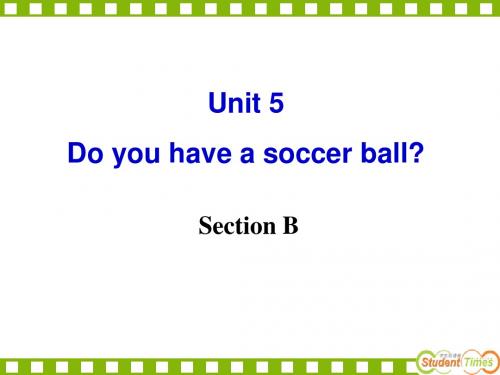
Haha! It’s difficult.
boring 无聊的,令人生厌的
Hmm. It’s boring.
1. interesting 有趣的, 令人感兴趣的
2. fun
有趣的, 令人愉快的
3. relaxing
4. difficult
5. boring
轻松的
困难的
无聊的, 令人生厌的
What do the pictures mean?
Let play baseball.
A: Let’s play basketball. B: I
don’have t a basketball.
A: Well, let’s play ping-pong.
B: That play volleyball.
B: I don’t have a volleyball.
A: Well, let’s play soccer. B: That sounds good/interesting/fun…
A: Let’s … B: That sounds good/interesting/difficult/
boring/fun/relaxing/....
computer
___you _____ Do have a computer? Yes, I_______. do I ______ have a computer
√
___ he have _____ Does a ruler? No, he doesn ______. ’t ’t have a Hedoesn __________ ruler.
有趣的
2a Find the sports words in the unit. Write them in the correct column.
- 1、下载文档前请自行甄别文档内容的完整性,平台不提供额外的编辑、内容补充、找答案等附加服务。
- 2、"仅部分预览"的文档,不可在线预览部分如存在完整性等问题,可反馈申请退款(可完整预览的文档不适用该条件!)。
- 3、如文档侵犯您的权益,请联系客服反馈,我们会尽快为您处理(人工客服工作时间:9:00-18:30)。
Unit 5 Do you have a soccer ball? 导学案
section B3a—Self Check (第6课时)
班级:学号:姓名:
【学习目标】
1)知识与技能:
1.掌握本节课的9个单词和4个短语
2.学会写某人所拥有物品的短文
2)过程与方法:
通过听,说等一些活动培养良好的听力习惯和能力,再通过通过独学和小组合作,学会使用本单元重点句型。
【学习重难点】
1.掌握本节课的9个单词和4个短语
2.学会写某人所拥有物品的短文
【预习导学】
一、回顾反馈预习提纲:
1、单词:great美妙的;big大的only 但是,只;仅仅them
他们(的宾格)everyday每个天;一日
2、复数:racket --rackets basketball --basketballs volleyball--volleyballs
第三人称单数:have -has watch--watches play--plays
3、短语:
do sports参加体育运动every day 每天
Watch TV 看电视three volleyballs 三个排球
【合作探究】
探究一.
Lead in: Find the sports words in the unit. W rite them in the correct column.
Ask and answer: Do you have a soccer ball? Do you like sports? What b alls do you have? Let’s see what about Frank, Gina and Wang Wei.
探究二、学生自做3a,再写出几个体育有关的物品
探究三、组内交流,完成3b
探究四、学生展示,其他学生质问或补充,教师点拨,完成3c
探究五、组内交流,完成self check1和2核对答案,班内展示成果
探究六、小组讨论:结合句子He only watches them on TV.
探究七、.Writing a composition: Write about yourself and your partner w ith “but”.
【导学测评】
测评一
1、句型转换
(1)I watch TV every day.(改为否定句)
I _____ ______ TV e ver y day.
(2)He plays volleyball.(对划线部分提问)
______ ______ he ________?
(3)Does th e math teacher have a baseball?(作否定回答)
_______ , he _______ .
(4) My English teacher have a soccer ball. (改为否定句)
My English tea cher ______ ______a soccer ball.
(5) I have a brther. (改为一般疑问句,并作肯定回答)
— ______ you ______ a brther ?
— Yes,_____ _______.
测评二
2.用所给词的适当形式填空。
My cousin _____(watch )TV every day. Tim ______(play) sports on Saturday. There are 37 ______(student) in my class English is ______(easy). Ilike it very much. Our teacher ______(love) us very much.
课后反思:。
